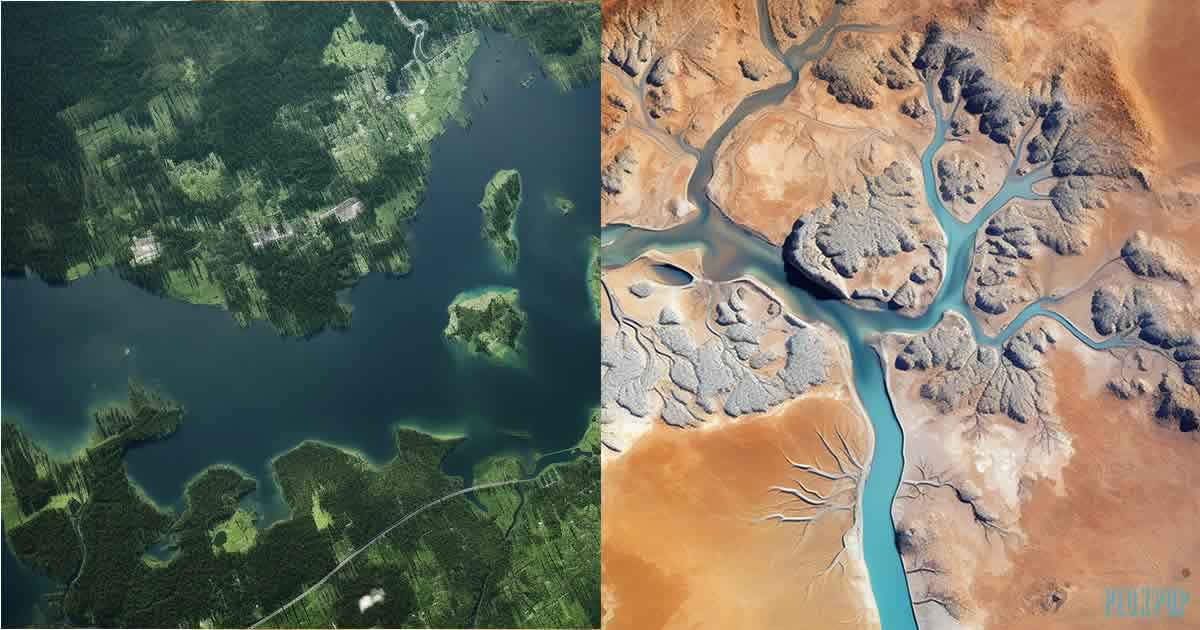A recent study has unveiled a disturbing truth — the world’s large lakes and reservoirs are steadily losing their water. Satellite data, climate models, and hydrological models have all pointed to the same conclusion — 53% of these water bodies have been experiencing significant shrinkage since 1992. This isn’t a localized issue; it’s a worldwide crisis, affecting bodies of water from the Caspian Sea nestled between Europe and Asia, to Lake Titicaca in South America.
The total water loss amounts to a staggering 22 gigatons per year over the last three decades. To visualize this, imagine the largest reservoir in the United States, Lake Mead, drying up 17 times over.
The Culprits: Human Activity and Climate Change
The research, spearheaded by Fangfang Yao, a hydrologist at the University of Virginia, identifies climate change and human overuse as the main factors behind this worrying trend. Yao’s team scrutinized nearly 2,000 lakes, which make up 95% of the world’s lake water. They analyzed 250,000 images of these lakes and their surroundings, captured between 1992 and 2020, using climate and hydrological models.
The study, published in the prestigious journal Science, found that human overuse is causing lakes like the Aral Sea in Central Asia and the Dead Sea in the Middle East to shrink. On the other hand, rising global temperatures are causing more damage to lakes in Afghanistan, Egypt, and Mongolia. However, no region is immune to this drought.
The Ripple Effect on Humans and Ecosystems
The research also emphasizes that a quarter of the global population resides in a lake basin that is witnessing a decline. This implies that around 2 billion people are directly affected by this drought. “More than half of the net water loss in natural lakes can be traced back to human impacts, both direct and indirect,” Yao explained. Balaji Rajagopalan, a co-author of the study, highlighted the need for intelligent water management to tackle this issue. “Reviving a lake that is drying up or has already dried up is challenging… This is particularly crucial in a world that is warming up rapidly,” he added.
The decrease in lake water storage not only impacts human populations but also disrupts vital ecosystem services. These include freshwater storage, food supply, habitats for waterbirds, cycling of pollutants and nutrients, and recreational activities.
Turning the Tide
The World Meteorological Organization issued a warning that global warming is likely to surpass the 1.5ºC temperature limit within the next five years. The repercussions are already being felt across the globe: intense heatwaves, unprecedented droughts, and the extinction of numerous species. Experts warn that exceeding this threshold would make everything much more challenging to control.
However, the study does offer a glimmer of hope. While the majority of the world’s lakes are shrinking, 24% of the lakes studied have seen significant increases in water storage. Many of these are located in sparsely populated areas, such as the Tibetan plateau and the vast plains of North America, as well as regions with new reservoirs, like the basins of the Yangtze, Mekong, and Nile rivers.
Lake Sevan in Armenia is one such example of a lake that has seen growth. Since the 2000s, local authorities have enforced conservation laws on water extraction in the area. “If human consumption is a significant factor in the decline of lake water storage, then we can adapt and explore new policies,” Ben Livneh, a collaborator in the research, suggested. This provides a hint of where to begin our efforts.
Final Thoughts
The global decline in lake water storage is a hidden catastrophe that demands our immediate attention. Its impacts are far-reaching, affecting not only our environment but also the lives of billions of people. While the situation is grave, it’s not without hope. With intelligent water management, conservation laws, and innovative policies, we can adapt and mitigate this crisis. The case of Lake Sevan in Armenia serves as a beacon of hope and a model to follow.
The shrinking of the world’s major lakes is a wake-up call for all of us. It’s a stark reminder that our actions have consequences, and it’s our responsibility to protect our planet. As we move forward, let’s remember that every drop of water is precious, and every effort to conserve it can make a significant difference.






Leave a Comment